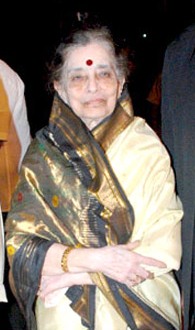Anjali is a Sanskrit word that means "divine offering". It is not only a given name, but also the name given to the greeting between Hindus, Buddhists and other religions on the Indian subcontinent: hands folded together. It may refer to:

A mudra is a symbolic or ritual gesture or pose in Hinduism, Jainism and Buddhism. While some mudras involve the entire body, most are performed with the hands and fingers.
Bobby or Bobbie may refer to:

Namaste, sometimes called namaskar and namaskaram, is a customary Hindu non-contact manner of respectfully greeting and honouring a person or group, used at any time of day. It is found on the Indian subcontinent, and among the Nepalese and Indian diaspora. Namaste is usually spoken with a slight bow and hands pressed together, palms touching and fingers pointing upwards, thumbs close to the chest. This gesture is called añjali mudrā; the standing posture incorporating it is pranamasana.
A mudra is a term woven into compositions in Indian classical music, particularly Carnatic music, that indicates the identity of the composer, a patron, the raga, tala, or style. A composer might use his own name or a pseudonym. Not all composers have mudras, and they do not necessarily relate to the composer's name.
Pandey, Pande, or Panday is a surname found commonly among the communities of Saryupareen Brahmins in India and both Saryupareen Bahun and Rajput Chhetri communities of Nepal.
Tiwari is a surname of the Hindu Brahmin communities commonly found in India and Nepal. Alternative spellings include Tiwary and Tewari.
Bhandari or Bhandary is a surname found in various Hindu castes and communities in India and Nepal. Bhandari means treasurer, keeper of a storehouse. In Punjab, Bhandaris belong to the Khatri caste. In Nepal, the surname is used by both Matwali and Tagadhari Chhetris, as well as Bahuns.
Chakraborty is a surname of Bengali Hindus and Assamese Hindus of India and Bangladesh, the surname is used by people of the Bengali Brahmin and Assamese Brahmin communities.
Dutta, also spelled Datta, is an Indian family name Its variation is Dutt.
Shetty is a surname originating from coastal Karnataka state of India. Found amongst the Bunt (community). The word Shetty is derived from the Sanskrit word Śreṣṭha or Śreṣṭhin meaning superior, Prakritised as Seṭhī, and then Śeṭ or Śeṭī.
Baral is a surname found in people from Bangladesh, India, Nepal, as well as a small number of Jews from Poland and Austria.

Añjali Mudrā, is a hand gesture mainly associated with Indian religions and arts, encountered throughout Asia and beyond. It is a part of Indian classical dance postures such as Bharatanatyam, yoga practice, and forms part of the greeting Namaste. Among the performance arts, Anjali Mudra is a form of non-verbal, visual communication to the audience. It is one of 24 samyukta mudras of the Indian classical arts. There are several forms of the Anjali Mudra such as the brahmanjali.
Gayen, sometimes anglicised as Gain, is a Bengali surname found in the Indian subcontinent, mainly in the Indian states of West Bengal, Odisha and Assam. In Bengali, the title Gayen (গায়েন) referred to anyone involved in the medieval bardic tradition, i.e. composition of Bengali poetry and music.

Sulochana Mahadev Kadam, better known as Sulochana Chavan, was an Indian singer who was known for her lavanis in Marathi.
Chowdhury is a title of honour, usually hereditary, originating from the Indian subcontinent. It is an adaption from Sanskrit. During the Mughal rule, it was a title awarded to eminent people, while during British rule, the term was associated with zamindars and social leaders. The common female equivalent was Chowdhurani. Many landlords under the Permanent Settlement carried this surname. Land reforms after the partition of India abolished the permanent settlement. In modern times, the term is a common South Asian surname for both males and females.
Bhardwaj is a surname used by Brahmins and rajputs relating to sage Bharadwaja gotra in India.
Mudra or Múdra is a predominantly Czech–Slovak surname. In East-central Europe it may be derived from Czech moudrý or Slovak múdry, both with the meaning "wise."
People with the name include:

Jayeshbhai Jordaar is a 2022 Indian Hindi-language comedy-drama film written and directed by Divyang Thakkar. Produced by Maneesh Sharma and Aditya Chopra under the Yash Raj Films, the film stars Ranveer Singh as the eponymous lead. He plays the son of a traditional Gujarati sarpanch, who believes in equal rights between males and females in society. Shalini Pandey, Boman Irani and Ratna Pathak Shah also play pivotal roles.




